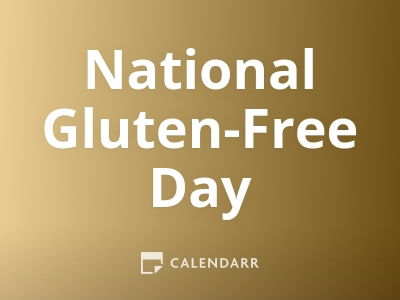- Calendar
- Calendar 2026
- January
- National Gluten-Free Day
National Gluten-Free Day
National Gluten-Free Day is observed on the second Monday of January and is dedicated to raising awareness and educating people about the benefits of gluten-free diets and supporting those with gluten sensitivity.
This day is an opportunity to not only learn about gluten but also discover delicious gluten-free recipes and celebrate inclusivity in dining.
Origin of National Gluten Free Day
National Gluten Free Day was established by Cassy Joy Garcia, founder of Fed + Fit, as a way to raise awareness about gluten-free living.
The day was first celebrated in 2014, aiming to support individuals with celiac disease and gluten intolerance. Observed on the second Monday of January each year, National Gluten Free Day encourages understanding and compassion for those who must follow a gluten-free lifestyle for health reasons, while promoting broader awareness of gluten-free dietary needs and challenges.
What Is Gluten?
Gluten is a type of protein found in wheat and other grains, such as barley, rye, and spelt. It gives dough its elasticity and allows it to rise and hold its shape, contributing to the chewy texture of foods like bread and pasta. Gluten is composed of two main proteins, gliadin and glutenin, which work together to create the stretchy network that traps gas bubbles during baking, helping baked goods rise and achieve their desired structure.
For most people, gluten is harmless and a common part of their diet. However, some individuals may experience adverse reactions to gluten. People with celiac disease, an autoimmune condition, react to gluten with inflammation in the small intestine, leading to digestive issues and nutrient absorption problems. Other individuals may have non-celiac gluten sensitivity, experiencing symptoms without the immune response seen in celiac disease.
- Celiac Disease: This is an autoimmune disorder where gluten triggers the immune system to attack the small intestine, damaging its lining. This damage reduces nutrient absorption, leading to malnutrition, digestive issues, anemia, fatigue, and even neurological issues. Celiac disease requires a 100% gluten-free diet, as even small traces of gluten can trigger symptoms and cause lasting harm.
- Non-Celiac Gluten Sensitivity (NCGS): Unlike celiac disease, NCGS doesn’t cause an autoimmune response or intestinal damage. However, those with NCGS experience symptoms like bloating, abdominal pain, headaches, fatigue, and brain fog when they consume gluten. Since there’s no test to diagnose NCGS, it’s often identified by excluding other conditions and noting symptom improvement on a gluten-free diet.
- Wheat Allergy: Different from both celiac disease and NCGS, a wheat allergy is an allergic reaction to proteins in wheat, which includes gluten but isn’t limited to it. Symptoms range from mild (like hives) to severe (like anaphylaxis). People with a wheat allergy may not need to avoid gluten from non-wheat sources but do avoid all wheat products.
Benefits of Going Gluten Free
- Relief from symptoms like bloating, fatigue, and headaches for those with gluten intolerance
- Improved nutrient absorption, helping prevent deficiencies like anemia
- Reduction in chronic inflammation, which can ease joint pain and other inflammation-related issues
- Better digestive health through increased intake of naturally gluten-free foods
- Enhanced mental clarity and focus, potentially reducing brain fog
- Potential weight management benefits by replacing processed foods with whole, nutrient-rich alternatives
Observe National Gluten-Free Day
On National Gluten Free Day, embrace the benefits of gluten and experiment with different gluten-free recipes. Be it gluten-free pizzas or brownies, there are endless options for you to try.
Try going gluten-free for the day to experience their daily challenges, or learn more about celiac disease and gluten intolerance to spread understanding.
Supporting gluten-free brands and showing compassion to those with dietary restrictions are simple yet impactful gestures.
You can also make a difference by joining community events or supporting organizations that fund research and provide resources. Small actions on this day help create a more inclusive and understanding community.

Other Celebrations
-
May 03 Sat
-
Jul 03 ThuInternational Plastic Bag Free Day
-
Sep 16 Tue
-
Sep 22 MonCar Free Day
-
Sep 22 MonWorld Car-Free Day
-
Dec 14 SunNational Free Shipping Day

National Gluten-Free Day 2025
Date: Monday, 11 January 2027
Date: Monday, 10 January 2028
Date: Monday, 08 January 2029










